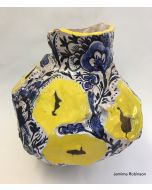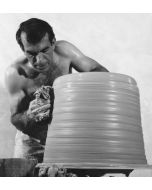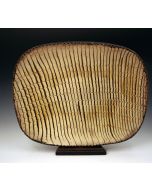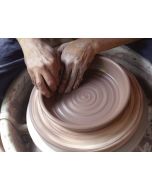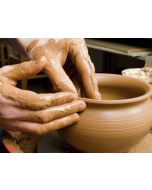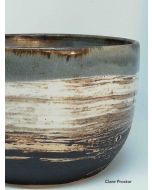Friday evening pottery
Time: 18:15 - 21:15
Location: Keeley Street
- Course Code: VR791
- Dates: 17/05/24 - 21/06/24
- Time: 18:15 - 21:15
- Taught: Fri, Evening
- Duration: 6 sessions (over 6 weeks)
- Location: Keeley Street
- Tutor: Shelley Wilson
Course Code: VR791
Duration: 6 sessions (over 6 weeks)
Please note: We offer a wide variety of financial support to make courses affordable. Just visit our online Help Centre for more information on a range of topics including fees, online learning and FAQs.
What is the course about?
You will make a variety of ceramic objects using different construction techniques and methods. The surfaces can be decorated using a wide range of options with slip and glaze to achieve both Earthenware and Stoneware temperatures. Plus an introduction to historical & contemporary ceramics
Beginners & improvers will work alongside each other in a mutually supportive environment in which you will learn both from your tutor and each other.
What will we cover?
Beginners: Through a structured syllabus this course will introduce the beginner to gain the fundamental skills to work with clay and glaze and begin to understand it’s potential to make a ceramic form whether functional or sculptural. You will look at different types of clay and learn how to build: shape and mould it using basic hand-building techniques. You will have time to experiment with basic techniques for decorating the clay surface using clay coloured slip and will have a basic introduction to glazing.
Improvers: Whilst working on personal or course projects students will be encouraged to experiment with different materials and methods to develop their ceramic techniques and design skills.
What will I achieve?
By the end of this course you should be able to...
- Use a range of ceramic techniques such as coiling, pinch, slab building, beginners level
- Be familiar with press moulding, slip decoration and glazing, beginners level
- Be aware of good studio practice
Improvers:
- Use their hand building techniques with more confidence
- Have a first understanding of throwing on the wheel- beginners level
- Choose appropriate techniques and materials in order to develop individual project work, as guided by your tutor.
What level is the course and do I need any particular skills?
All levels are welcome.
How will I be taught, and will there be any work outside the class?
You will learn through practical demonstrations, group and individual discussions and tutorials, slide lectures and personal tuition. A wide range of learning resources and equipment are provided.
In order to ensure that you make the best possible progress on your course, you will have regular feedback from your tutor, in a constructive and supportive environment.
In addition to the above, students are encouraged to do some homework outside class such as researching by visiting Ceramic/ fine art shows and ceramic/ fine art in museums (the ceramic department in the Victoria and Albert Museum);
Researching by developing personal projects as advised by your tutor.
Are there any other costs? Is there anything I need to bring?
Old clothes and sensible footwear advised, you are welcome to bring your own tools but not essential. You will be expected to show good workshop practice and follow health and safety guidelines.
Most ceramic materials are covered by the course fee. There is a charge of £2.50 per 500g for clay before firing, the porcelain charge is £20.00per bag/ £10.00 per half bag.
Tools are available within the department for use but you may want to purchase your own. Your tutor will advise you which tools to purchase.
If you would like to buy art materials for your personal use outside of the course, City Lit students receive 10% discount off everything* from Cass Art, the UK's leading art supplies retailer. Your tutor will advise you on what you should buy. You will need to show your enrolment receipt in-store to receive your discount. Visit the Charing Cross shop at 13 Charing Cross Road WC2H 0EP or find your local shop at www.cassart.co.uk. *Terms and conditions apply, visit www.cassart.co.uk/students.
When I've finished, what course can I do next?
There are a variety of ceramic classes during the day and evening. See the course guide for term dates and further details.
Within City Lit you could progress onto:
City Lit Ceramics course - VR710,
City Lit Ceramics Portfolio Course - VR711,
Ceramics Diploma - VR712,
All of which are structured courses that can lead to higher education or independent studio practice.
